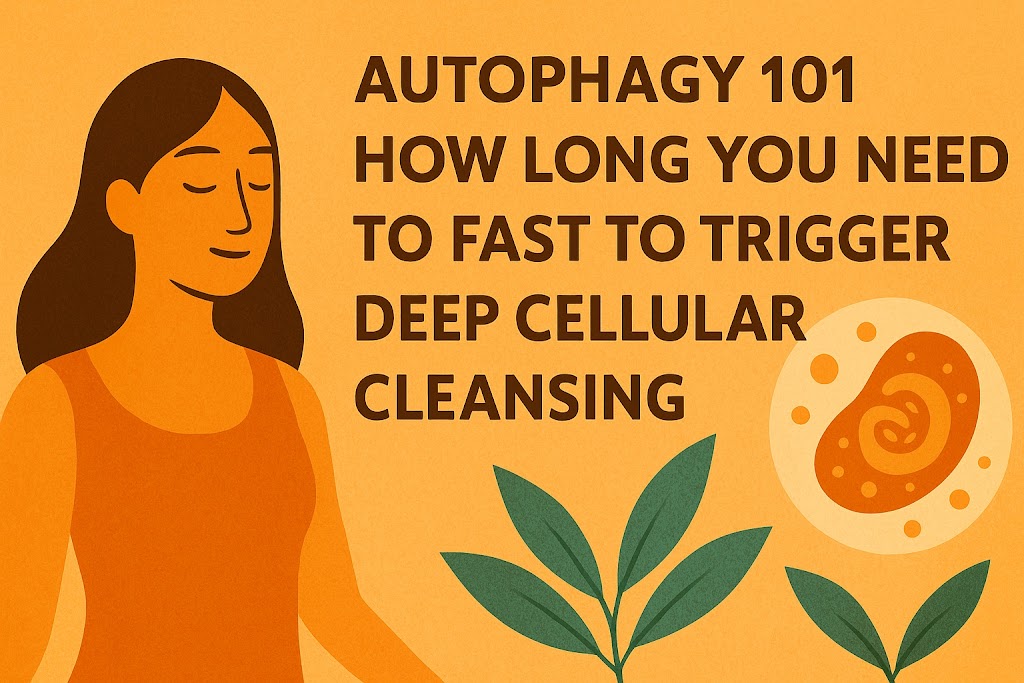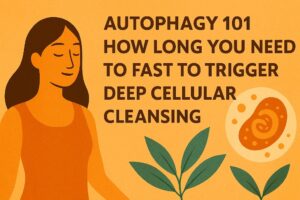Autophagy 101: How Long You Need to Fast to Trigger Deep Cellular Cleansing
Intermittent fasting isn’t just about weight loss—it can also trigger one of your body’s most powerful detox systems: autophagy. This natural process allows your cells to clean out waste, repair themselves, and potentially extend lifespan. But how long do you need to fast to activate it?
What Is Autophagy?
The word “autophagy” literally means “self-eating.” It’s your body’s way of breaking down and recycling damaged or unnecessary cellular components. This helps eliminate toxins, clear out dysfunctional mitochondria, and improve metabolic efficiency. The result? Healthier cells, stronger immunity, and reduced risk of chronic disease.
Why Is Autophagy Important?
Scientists link autophagy to a wide range of benefits, including:
- Reduced inflammation
- Improved insulin sensitivity
- Slower aging and neuroprotection
- Lower cancer risk (by clearing damaged cells)
That’s why it’s not just about when you eat, but what happens when you’re not eating that makes fasting so powerful.
How Long Do You Need to Fast for Autophagy?
Autophagy doesn’t kick in right away. Your body typically begins this process after 16–20 hours of fasting, but stronger effects are seen after 24–48 hours without food. However, this varies based on your metabolic state, activity level, and overall health.
Estimated Timeline for Autophagy:
- 0–12 hours: Your body uses stored glucose for energy. Minimal autophagy.
- 12–18 hours: Insulin drops; mild autophagy may begin.
- 18–24 hours: Ketones rise, triggering more significant autophagy.
- 24–48 hours: Deep cellular recycling begins.
For maximum benefits, many experts recommend doing an extended 24-hour fast 1–2 times per month. Beginners can start with tracking progress with a fasting journal.
Can Supplements or Drinks Affect Autophagy?
Yes. Anything that spikes insulin or activates digestion can pause autophagy. Stick to:
- Black coffee – Organic Mold Free Coffee Whole Bean Medium Roast – USDA Certified Hand
- Yogi Tea – Green Tea Super Antioxidant (6 Pack) – Organic Green Tea
- REDMOND Re-Lyte Hydration Electrolyte Powder Mix (Unflavored)
- Bragg Apple Cider Vinegar Capsules
- Avoid anything with sugar, protein, or more than a few calories during your fast if autophagy is your
goal.
Who Should Avoid Longer Fasts?
Autophagy is powerful, but extended fasting isn’t for everyone. If you’re pregnant, underweight, diabetic, or have a history of eating disorders, speak to a healthcare provider first. Some fasting guides tailored for women can offer safer, hormone-friendly approaches.
Supporting Autophagy Without Fasting
Even if you’re not ready for a 24-hour fast, you can still support autophagy through:
- Berberine supplements
- Quercetin + Zinc
- Sauna use or infrared heat therapy
- Short bouts of high-intensity exercise
Final Thoughts: Fasting for Longevity Starts With Understanding Autophagy
Autophagy is one of the most fascinating benefits of intermittent and extended fasting. It’s not instant—but with consistency, your body can unlock a deeper level of healing and renewal. Whether you fast for 16 or 36 hours, knowing when and how autophagy works will guide your practice for maximum benefits.
💡 Share this post with someone who wants to try intermittent fasting!
And don’t forget to tag @TheResetRitual if you’re sharing your journey 🧘♀️💬
Disclaimer: This article is for informational purposes only and is not medical advice. Always consult with your healthcare provider before making changes to your diet, fasting routine, or lifestyle. This post may contain affiliate links. As an Amazon Associate, I earn from qualifying purchases.


